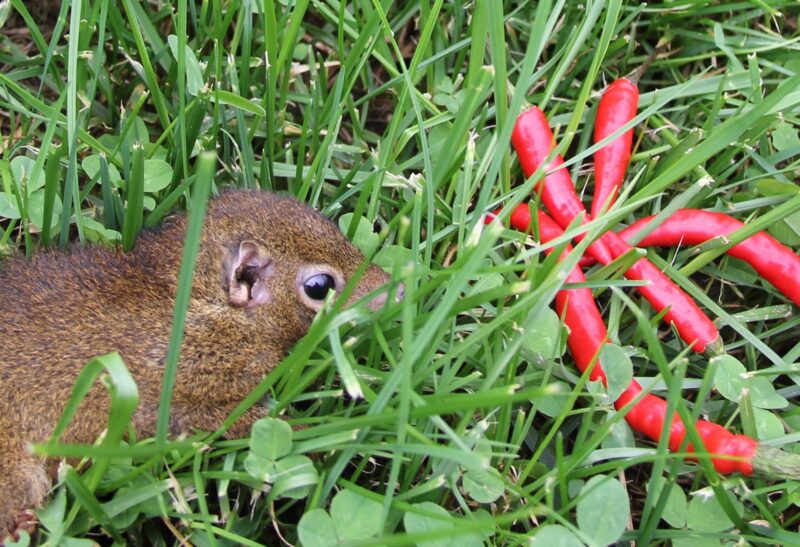Envision strolling through an enchanting garden, where the gentle rustling of leaves and the earthy scent of soil envelop you in nature’s embrace. As you wander along the meandering paths, you’ll likely spot a familiar sight that is both vivacious and versatile – the venerable pepper plant. Nestled in numerous gardens, the pepper plant is akin to an old friend for many green thumbs. It wins hearts not just for the flair it adds to the garden, but also for the spice it brings to the kitchen.
There’s a certain allure in cultivating pepper plants. They’re akin to that low-maintenance friend who doesn’t demand constant attention, making them a delight for both novice and seasoned gardeners. What’s more, the convenience of plucking a pepper or two, right when inspiration strikes for a culinary experiment, is simply unmatched. Whether you’re in the mood for a sizzling stir-fry, a hearty stew, or a zesty salsa, peppers are ready to jump in and jazz things up.
Caterpillar:
Caterpillar is an herbivorous animal and is found in many gardens. The look of this small animal is such that sometimes it is hard to figure out whether it is sitting on the pepper plant or not. It can cause a lot of damage to your pepper plant. It basically eats leaves but it has also been observed that it can even finish the entire pepper plant overnight. Its presence can be known due to its dropping on the leaves of a pepper plant.
Slugs and Snails
Slugs and Snails can also cause a lot of harm to this plant. So, when you notice any slug or snail in your kitchen garden it is time that you do not ignore it. You need to remove it from your garden so that your pepper plants and other plants are safe. For this, you can easily remove them by picking them with your hands. They can be detected as they leave a trail behind them. So, if you can’t see them but if you see the trail as well you need to be extra cautious.
White files
These files are dangerous and harm the plant in many ways. You can identify it by its white color and small size. In case if you are not able to figure out the best way to find out whether they are present on the pepper plant is to shake your plant. Once you shake it these files will come out and fly. So, if you think that there is a presence of these whiteflies n in your garden you can get rid of it. This can be done by shaking the plant almost daily so that these files find some other place to settle down.
Thrips
Thrips are very small in size and it is difficult to spot them. If you see them in your garden should do things to remove them. If you do not take timely action to remove it, it can eat the leaves and flowers of your plant. It is easy to control thrips compared to other animals. You can spray an organic spray to get rid of it.
Pepper Weevils
These are small insects but their body is hard. With their long proboscis, they can easily eat flowers and leaves of the pepper plant. Adult as well as larvae both cause damage and even eat the pepper plant. The fruits of the pepper plant are mostly damage by the larvae.
Rabbits and Deer
Rabbits and deer can also destroy the pepper plant completely. The only thing is that it is comparatively easier to notice them. So, if you think that your pepper plants can be damaged by them then you can fix a fence around your plant and save it.
Apart from the above-mentioned insects and animals, there are numerous other animals that can damage the pepper plant. So, you need to monitor your kitchen garden daily so that you come to know if there is an intruder in your garden. To get rid of these intruders you need to water the plants daily and use organic spray to keep them away. You also need to shake the plant a little bit to get rid of flies. Sometimes these animals eat the half leaf and sometimes you see a small hole in the leaf which is an indication that there is the presence of either of these animals in your garden. Take care of your pepper plants by understanding the tips mentioned above.
Epilogue
In conclusion, the pepper plant holds a special place in the hearts of gardeners and culinary enthusiasts alike. Its versatility and low-maintenance nature make it a cherished addition to any garden. However, as with any plant, it is susceptible to pests and animals that can cause damage. From caterpillars to slugs, whiteflies to thrips, and even rabbits and deer, these intruders can pose a threat to the well-being of pepper plants. Monitoring your garden daily and taking proactive measures such as using organic sprays, shaking the plants to deter flies, and implementing protective measures like fences can help safeguard your pepper plants from harm.
